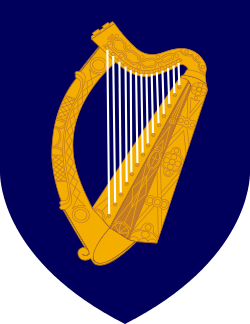Elections in the Republic of Ireland
 |
| This article is part of a series on the politics and government of the Republic of Ireland |
|
Judiciary |
|
Administrative geography |
In Ireland, direct elections by universal suffrage are used for the President, the ceremonial head of state; for Dáil Éireann, the lower house of the Oireachtas or parliament; for the European Parliament; and for local government. All elections use the single transferable vote (STV) in constituencies returning three or more members, except that the presidential election and by-elections use the single-winner analogue of STV, elsewhere called instant-runoff voting or the alternative vote. Members of Seanad Éireann, the upper house of the Oireachtas, are partly nominated, partly indirectly elected, and partly elected by graduates.
STV is a form of proportional representation, and coalition governments have been the rule since 1989. Fianna Fáil and Fine Gael were the largest parties in every general election from 1927 to 2007, with the Labour Party usually third. Smaller parties and independents exist in the Dáil and more so in local government.
Eligibility to vote
Residents of the state who are Irish citizens or British citizens may participate in elections to the national parliament. Residents who are citizens of any EU state may vote in European Parliament elections, while any resident, regardless of citizenship, may participate in local elections.[1]
Entitlement to vote, based on citizenship:
| Resident citizens | Local elections | European elections | Dáil Elections | Presidential elections | Referendums |
|---|---|---|---|---|---|
| Irish citizens | |||||
| Irish citizens in Northern Ireland | |||||
| British citizens | |||||
| EU citizens | |||||
| Non-EU citizens |
Early voting
Military personnel, whether serving at home or abroad, vote by postal ballot. These votes are delivered by a courier service, usually a commercial one, but a military courier is used for ballots cast by Irish troops in Lebanon and Syria.[2] Voters living on islands off the west coast in Galway, Mayo, and Donegal traditionally voted two or three days before polling day, but in 2014 the gap was narrowed, when they voted just one day beforehand.[3]
General elections
Elections to Dáil Éireann are required at least every seven years by the Constitution; statute law, currently the Electoral Act 1992, establishes a lower maximum of five years. Elections are by single transferable vote (STV), with each geographic constituency returning between three and five deputies (each called a Teachta Dála or TD). Constituencies since 1981 have been redrawn by an independent Constituency Commission after each census.
European elections
Elections to the European Parliament are held simultaneously across Europe every five years. In Ireland, as for Dáil elections, STV is used in constituencies returning three to five members.
Local elections
Local elections are held on the same day as European elections. Local electoral areas (LEAs) return between six and ten councillors by STV. Until the Local Government Reform Act 2014, separate county councils and borough/town councils were elected in parallel. The 2014 act replaced borough and town councils with municipal district councils comprising the county councillors from the LEA coterminous with the district.
Some members of Údarás na Gaeltachta were directly elected by Gaeltacht residents between 1980 and 2012, since when all have been appointed by the government.[4][5]
Presidential elections
The President of Ireland is formally elected by the citizens of Ireland once in every seven years, except in the event of premature vacancy, when an election must be held within sixty days. The President is directly elected by secret ballot under the system of the Alternative Vote. While both Irish and UK citizens resident in the state may vote in elections to Dáil Éireann (the lower house of parliament), only Irish citizens, who must be at least eighteen years of age, may vote in the election of the President. The presidency is open to all citizens of the state who are at least 35. A candidate must, however be nominated by one of the following:
- Twenty members of the Oireachtas (national parliament).
- Four local authorities.
- Themselves (in the case of an incumbent or former president that has served only one term).
Where only one candidate is nominated, he or she is deemed elected without the need for a ballot. For this reason, where there is a consensus among political parties, the President may be 'elected' without the occurrence of an actual ballot. No one may serve as President for more than two terms.
Referendums
The Constitution of Ireland recognises two types of referendums:
There have been 38 referendums for amendments to the Constitution of Ireland. There have been no ordinary referendums.
See also
- Voting system
- Politics of the Republic of Ireland
- List of Irish by-elections
- Irish general election timetable
- Irish general election, 1918
- Irish elections, 1921 in Northern Ireland and Southern Ireland
- Irish general election, 1922 leading to the Irish Free State
- Elections in Northern Ireland
- Dáil Election Summary
References
- ↑ "System seems complicated but your vote really does matter". Irish Independent. 23 May 2014.
- ↑ "Our peacekeepers among first to cast votes". Irish Independent. 23 May 2014.
- ↑ "Defence Forces helicopter glitch delays island poll". Irish Independent. 23 May 2014.
- ↑ "Údarás na Gaeltachta Act, 1979, Section 29". Irish Statute Book. Retrieved 11 June 2015.
- ↑ "Gaeltacht Act 2012, Schedule". Irish Statute Book. Retrieved 11 June 2015.
External links
- Adam Carr's Election Archive
- Parties and elections
- NSD: European Election Database – Ireland publishes regional level election data; allows for comparisons of election results, 1992–2007